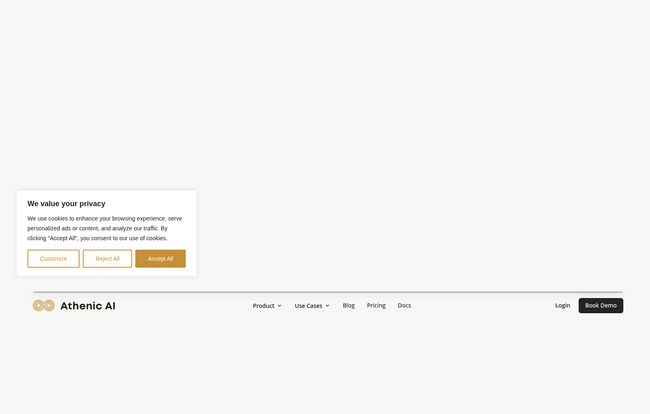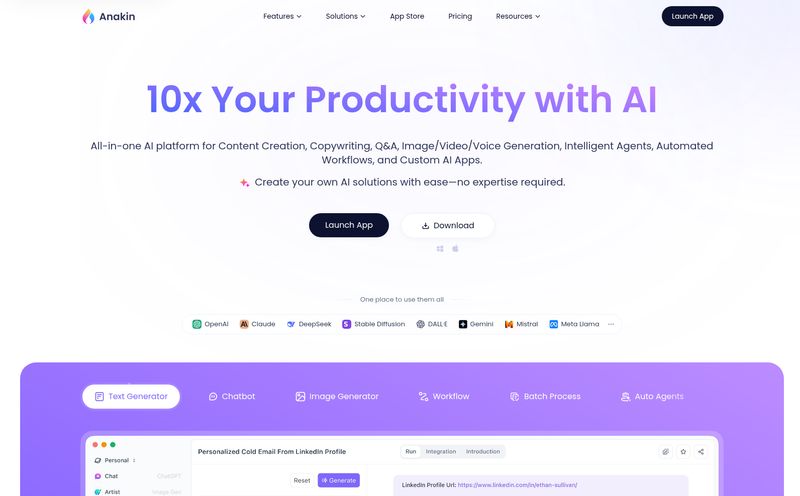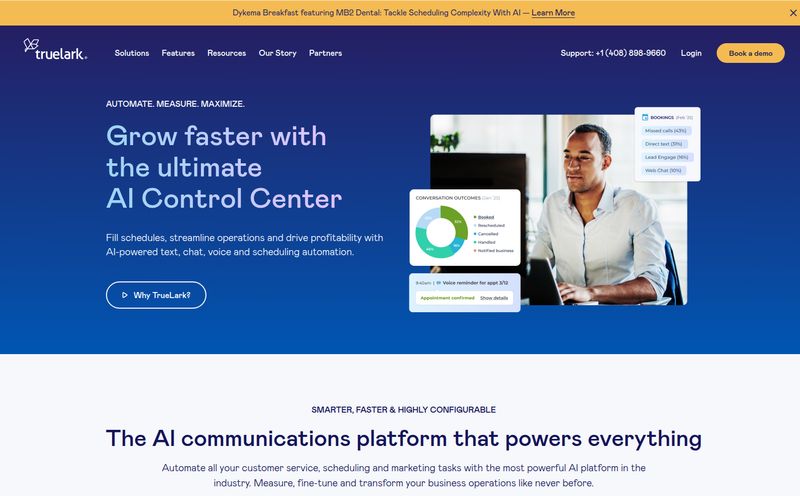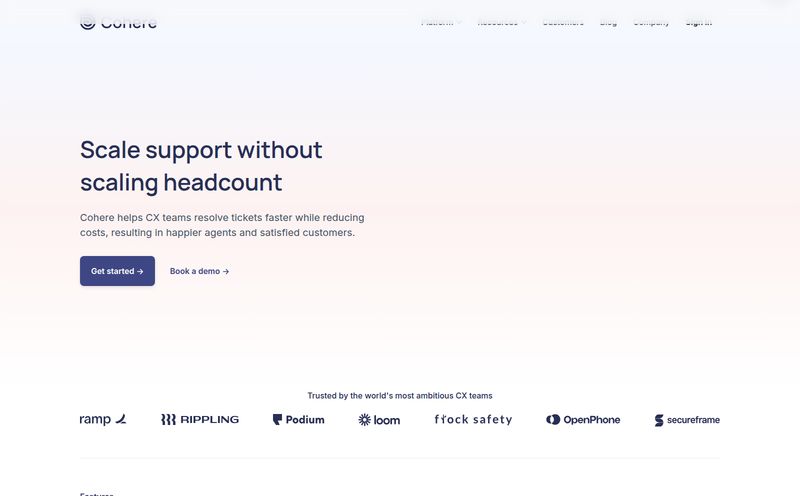We’ve all been there. Staring at a spreadsheet with so many tabs it makes your laptop fan cry for mercy. You know the answer to your most pressing business question is hiding in there somewhere, but getting to it feels like an archaeological dig. You either spend hours wrestling with pivot tables or you send a request to the data team and get put in a queue behind, well, everyone else.
I remember this one time, we were trying to figure out which marketing channels had the best lead-to-customer conversion rate for a Q3 campaign. The request went out on a Monday. We got the report the following Tuesday. By then, the campaign was practically over. That specific kind of frustration is something I think a lot of us in the marketing and growth space know all too well.
So when I started hearing buzz about tools that let you just ask your data questions in plain English, my ears perked up. One of the names that kept popping up was Athenic AI. The promise? To turn data analysis from a chore into a conversation. But does it live up to the hype? I had to find out.
So What Is Athenic AI, Really?
In the simplest terms, Athenic AI is a business intelligence (BI) tool that uses generative AI to let you query your data using natural language. Think of it less like a complex dashboard builder and more like a translator. It sits between you and your data (wherever it lives—Google Sheets, SQL databases, etc.) and translates your normal, human questions into the complex queries needed to get an answer.

Visit Athenic AI
You don't ask it to `SELECT COUNT(DISTINCT user_id) FROM sales_table WHERE purchase_date >= '2023-01-01' AND product_category = 'Widgets';`. Instead, you just ask, “How many unique customers bought widgets this year?”
And poof. It spits out a chart or a number. That’s the core idea. It’s designed to remove the technical barrier, democratizing data so that the person with the question—the marketer, the PM, the founder—can get the answer themselves. Instantly. No waiting for Tuesday.
How It All Clicks Together
The magic, as they say, is in the 'how'. Athenic AI connects directly to your existing data sources. For many of us, that's a mix of messy Google Sheets, maybe a CSV export from another tool, or if you're a bit more established, a proper SQL database like PostgreSQL.
Once connected, its AI gets to work understanding your data's structure. This is the crucial part. It builds a model of your business logic. You can even fine-tune it, defining key terms and metrics that are specific to your company. So when you say “ARR,” it knows exactly what you mean. This custom-tailoring is a big deal, as generic AI models can often get tripped up on company-specific jargon.
Then, you just start asking questions. And because it's built with 'Explainable AI,' it doesn’t just give you an answer; it shows you its work. This builds trust, because you can see how it arrived at the conclusion, which is something I always appreciate. It's not a black box.
"Athenic AI delivers insights that drive our strategic, dynamic decision-making. We have seen our success against larger competitors."
- Amy Zabin, CEO, Zola
My Experience: The Good, The Bad, and The Data
The "Aha!" Moments
The speed is the first thing that hits you. It’s not an exaggeration to say you get insights in seconds. Asking a follow-up question is as easy as typing a new sentence. This creates a really fluid workflow where one question naturally leads to another, letting you dig deeper and deeper without breaking your train of thought. It feels less like analysis and more like discovery.
For me, the biggest win is the empowerment. Not needing to know SQL is massive. It hands the power of data exploration to the people on the front lines. The folks at PMG and Framebridge seem to agree, based on their testimonials. When your creative team can quickly see which ad visual is performing best without needing to file a ticket, they can iterate faster. That’s a genuine competitive advantage.
A Few Caveats to Consider
Now, it's not all sunshine and perfect charts. The old saying, “garbage in, garbage out,” is more true than ever with AI tools. The quality of the insights you get from Athenic AI is completely dependent on the quality and cleanliness of your source data. If your Google Sheet is a disaster of inconsistent naming conventions and duplicate entries, the AI is going to struggle. It’s a powerful engine, but you have to give it good fuel.
Also, while it handles a huge range of questions, I suspect there are still edge cases—extremely complex, multi-join queries with bizarre conditional logic—where a seasoned data scientist will outperform the AI. For 95% of day-to-day business questions, it’s probably amazing. For that last 5% of pure data science wizardry, you'll likely still need a human expert.
And then there's the pricing...
What's the Deal with Athenic AI's Pricing?
This is probably my biggest gripe, and it's a common one in the B2B SaaS world. The pricing isn't listed publicly on their website. You have to 'Book a Demo' or 'Get Started' to find out what it'll cost you. I get why companies do it—it lets them tailor the price and weed out non-serious customers—but as a buyer, it's always a bit of a frustration.
From what is visible, they have two main tiers:
- Startup: This plan seems quite generous, offering unlimited questions, projects, and team members. It connects to the basics like SQL Databases, CSVs, and Google Sheets and includes business hours phone support. This looks perfect for smaller teams and startups who are moving fast and need answers now.
- Enterprise: This is the whole shebang. It includes everything in the Startup plan plus integrations with heavy-duty data warehouses like Snowflake and BigQuery, SaaS integrations, a dedicated account manager, and even options for private cloud deployment on AWS, GCP, or Azure. This is clearly for larger organizations with serious security and scale requirements.
Without hard numbers, it's tough to judge the value. But the feature set suggests they're positioning themselves as a premium, comprehensive solution rather than a cheap-and-cheerful tool.
So, Who Is This Tool Really For?
After playing around and thinking about it, I see a few key groups who would fall in love with Athenic AI:
Marketing & Growth Teams: To quickly analyze campaign performance, understand customer behavior, and optimize funnels without waiting on anyone.
Product Managers: To track feature adoption, user engagement, and get quick data to inform their roadmap.
Startup Founders & Small Business Owners: For those who wear all the hats and need to be their own data analyst. This could be a game-changer.
There's an ongoing debate about whether tools like this will replace data analysts. I don't think so. In my view, they augment them. By automating the routine, everyday questions, Athenic AI frees up skilled data professionals to focus on the truly complex, strategic challenges that AI can't solve yet. It turns them from report-pullers into true data scientists.
Final Thoughts: Is Athenic AI Worth Booking a Demo For?
So, the million-dollar question (or whatever the undisclosed price is). Is it worth it?
If the pain of slow, inaccessible data is a regular problem for your team, then my answer is a resounding yes. The potential to speed up decision-making and empower your non-technical team members with data is immense. It represents a fundamental shift in how we interact with business intelligence—making it more conversational, intuitive, and frankly, more human.
While the reliance on clean data is a real consideration and the opaque pricing is a bit of a hurdle, the core product is incredibly compelling. It's a peek into the future of analytics, and it's a future where everyone can get the answers they need, right when they need them.
Frequently Asked Questions
What kind of data sources can Athenic AI connect to?
Athenic AI can connect to a variety of sources. The Startup plan covers the essentials like SQL databases (e.g., PostgreSQL, MySQL), CSV files, and Google Sheets. The Enterprise plan expands this to include major data warehouses like Snowflake, Amazon Redshift, and Google BigQuery, as well as other SaaS platform integrations.
Do I need to know how to code to use Athenic AI?
Absolutely not. That’s the main value proposition. You interact with your data by asking questions in plain language, like English. No SQL or Python knowledge is required, making it accessible to anyone on your team.
Is Athenic AI secure for enterprise use?
Yes, security seems to be a priority, especially for the Enterprise tier. They offer features like enhanced security with streamlined SSO (Single Sign-On) capabilities and options for private cloud deployment, which are standard requirements for large organizations concerned with data privacy.
How is this different from using ChatGPT for data analysis?
That's a great question. While you can upload a CSV to ChatGPT, Athenic AI is a purpose-built platform. The key differences are direct, live integrations with your databases, the ability to build and fine-tune a custom AI model based on your specific business logic and terminology, and enterprise-grade security and governance features. It's designed for ongoing, reliable business analysis rather than one-off tasks.
How can I find out the exact pricing?
To get specific pricing details, you'll need to contact their sales team by clicking the "Get Started" or "Book Demo" buttons on their website. They tailor pricing based on your company's specific needs, scale, and the features you require.
References and Sources
- Athenic AI Official Website
- Harvard Business Review: "If Your Data Is Bad, Your Machine Learning Tools Are Useless"



